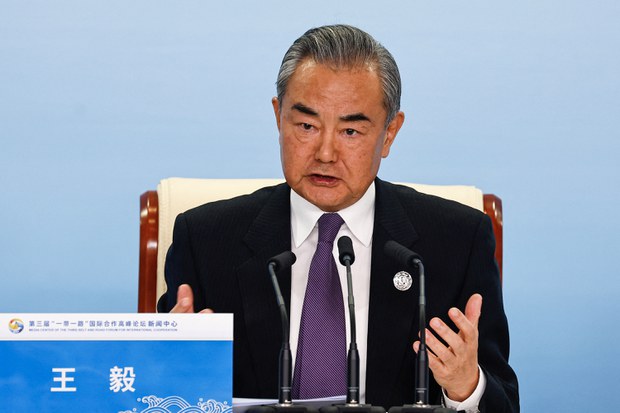China’s foreign minister in Washington to pave way for Xi
Share

Chinese Foreign Minister Wang Yi speaks at a press conference on the sidelines of the Third Belt and Road Forum at the media center in Beijing, Oct. 18, 2023.
Chinese Foreign Minister Wang Yi arrives in Washington on Thursday for talks expected to pave the way for U.S. President Joe Biden and his Chinese counterpart Xi Jinping to meet in San Francisco next month.
It’s the first by a Chinese foreign minister to the United States since before the COVID-19 pandemic, and comes more than four months after U.S. Secretary of State Antony Blinken visited Beijing as part of an effort to thaw increasingly frosty ties between the two powers.
Three other U.S. cabinet-level officials have visited Beijing since – Treasury Secretary Janet Yellen, Commerce Secretary Gina Raimondo and climate envoy John Kerry – but Wang, who had an open invitation to Washington, is the first Chinese official to make the return trip.
He will have dinner with Blinken on Thursday evening. Blinken told the U.N. Security Council on Tuesday that the two diplomats would discuss, among other things, how to stop the Israel-Hamas conflict from growing and spreading throughout the Middle East region.
On Friday, Wang is also expected to meet Biden at the White House after a scheduled meeting with National Security Adviser Jake Sullivan, with whom he met in Malta on Sept. 16 and 17 en route to Moscow.
Wang was previously China’s foreign minister from 2013 to 2022 but returned to the role in July after the ouster of his successor, Qin Gang, amid rumors of an affair with a U.S.-based Chinese TV presenter.
Groundwork laid
The visit comes ahead of next month’s meeting of the Asia-Pacific Economic Cooperation forum in San Francisco, which Xi is reportedly set to attend, for only his third trip abroad this year, after visits to Moscow in March and Johannesburg, South Africa, in August.
If Xi attends, it will be the first opportunity for Biden and Xi to talk face-to-face since their high-profile meeting in November last year at the G-20 summit in Bali, Indonesia, which was their first meeting since Biden took office. Last month, Xi skipped both the G-20 meeting in New Delhi and the U.N. General Assembly in New York.
American officials have appeared at pains this year to show the world they are trying to improve relations with Beijing after 12 months of mounting tensions over Taiwan, the South China Sea, microchips and an alleged Chinese spy balloon that was found floating over the United States.
But Biden himself has appeared less married to the program of thawed relations, calling Xi a “dictator” shortly after Blinken’s visit to Beijing and often alluding to the “enormous problems” in China’s economy.
That has continued even in the run-up to a possible Xi meeting.
During a joint press conference with Australian Prime Minister Anthony Albanese on Wednesday, Biden said China was facing “internal and external difficulties right now” causing it to engage in “intimidation.”
“Just this past week, PRC vessels acted dangerously and unlawfully as our Philippine friends conducted a routine resupply mission within their own exclusive economic zone in the South China Sea,” Biden said, using an acronym for the People’s Republic of China.
“I want to be clear, I want to be very clear: The United States’ defense commitment to the Philippines is ironclad,” he said.
Chinese Foreign Affairs spokesperson Mao Ning replied that Biden should stay out of a dispute she said was between Beijing and Manila.
“The U.S. is not a party to the South China Sea issue and has no right to interfere in the issue between China and the Philippines,” Mao said.
Conciliatory tone
Still, relations between Washington and Beijing appear on the mend.
Before flying out to Washington, Wang attended a meeting in Beijing between Xi and California Gov. Gavin Newsom, with both leaders speaking about the importance of improving U.S.-China ties.
Newsom told reporters he was in Beijing with hopes of “turning the page, of renewing our friendship and reengaging [on] foundational and fundamental issues that will determine our collective faith in the future.”
Xi also sent a conciliatory letter to the annual dinner of the National Committee on U.S.-China Relations in New York on Wednesday night.
According to the Chinese Foreign Ministry, Xi said that “whether China and the United States can find a right way to get along with each other bears on world peace and development and the future of humanity.”
“China is ready to work with the United States, in the three principles of mutual respect, peaceful coexistence and win-win cooperation,” the letter said, and wants to “properly manage differences, jointly address global challenges, and help each other succeed and prosper together to the benefit of both countries as well as the world.”
But the idea of a thaw has not been welcomed by all in Washington.
House Foreign Affairs Committee Chairman Michael McCaul and committee member Young Kim on Wednesday issued their own joint letter “condemning” the Chinese foreign minister’s visit.
The Chinese government has “become increasingly aggressive” since Wang’s last trip to Washington in 2019, the two Republican lawmakers wrote, and Beijing had “made clear that it is an unreliable partner.”
“During its meetings with Wang Yi, the Biden administration should not fall for false promises but demand deliverables such as releasing Americans taken hostage in China, stopping the export of fentanyl precursors, and halting its military expansionism,” the letter said.







